Niwana Johnson hurls her fists. She shoves. And then she starts running.
She sprints away from the two women she had been fighting, heading for asphalt. She leaps into the street. She doesn’t see the car, but she feels it.
The impact sends her careening into the air. Bystanders say she flew 20 feet high.
Niwana doesn’t quite black out. It’s more of a white out.
The floating sensation, the bright light, a crazy sense of calm, all those things people talk about feeling when they die. All these sensations bathe Niwana.
The next thing she hears is the beep of machines monitoring her pulse and oxygen levels. She feels the starchy sheets, smells the sterile cleanliness of Mount Sinai Hospital on Chicago’s West Side, a 319-bed facility next to Douglas Park.
And then she realizes she cannot move.
This is her cry-to-Jesus moment, one of many in a life that has seen a drug treatment facility 29 times. But this time, she thinks, she really means it.
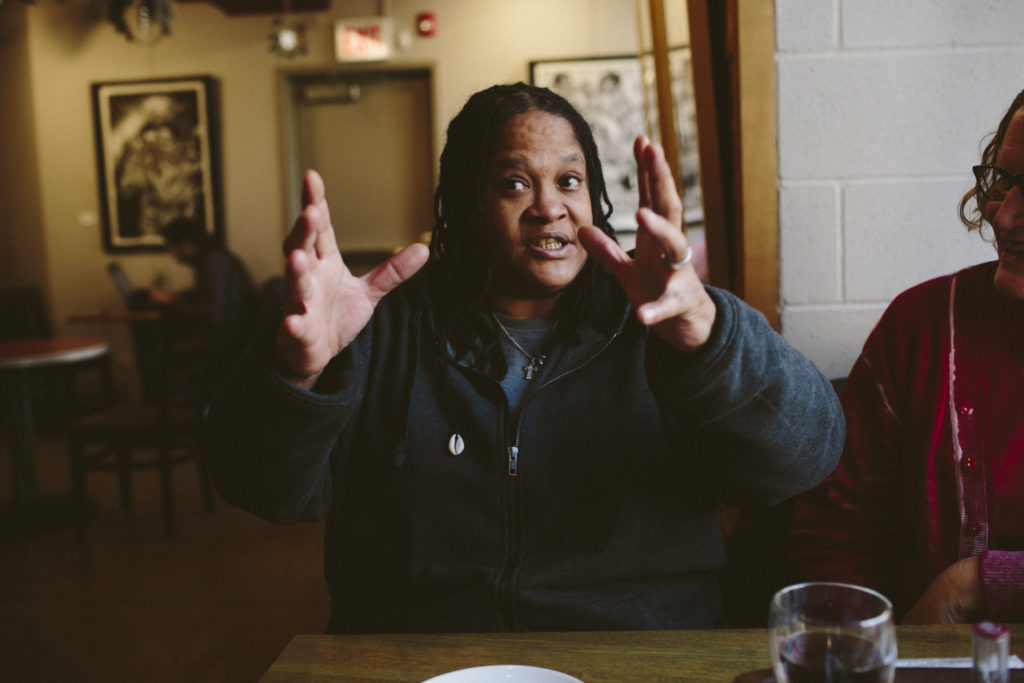
Help me move, God, Niwana pleads inwardly, and I will follow you.
Meanwhile more than 900 miles away, Nan Miller prays, too: Lord, I will follow you. Help me move.
She can no longer hide the effect her husband’s verbal and emotional abuse has had on her and her two sons. Nor the effects his secret life has had on their shared ministry as Navigators.
She has a friend who offers her and her boys, who are 6 and 8 at the time, a place to stay. They’re in Central Illinois, away from the home she shared with her husband in Florida, in a place where Nan could find community and support and a church.
This place in downstate Illinois, a village of a little more than 16,000 people called Morton, felt familiar to Nan, a lot like the rural area where she grew up. She packs a few bags and leaves with their sons in a desire to find honesty, health, and wholeness for her family. Believing God can still use her life, she begins to lead a Bible study in Morton with 7th-grade girls. She stays with them all the way through high school.
Later, she would uproot herself completely, driving two-and-a-half hours northeast to Chicago, from cows and cornfields to streets and skyscrapers.
She would settle in the North Side neighborhood of Uptown and start another Bible study in a building by Lake Michigan. Three years after she began, Niwana would walk into the room.
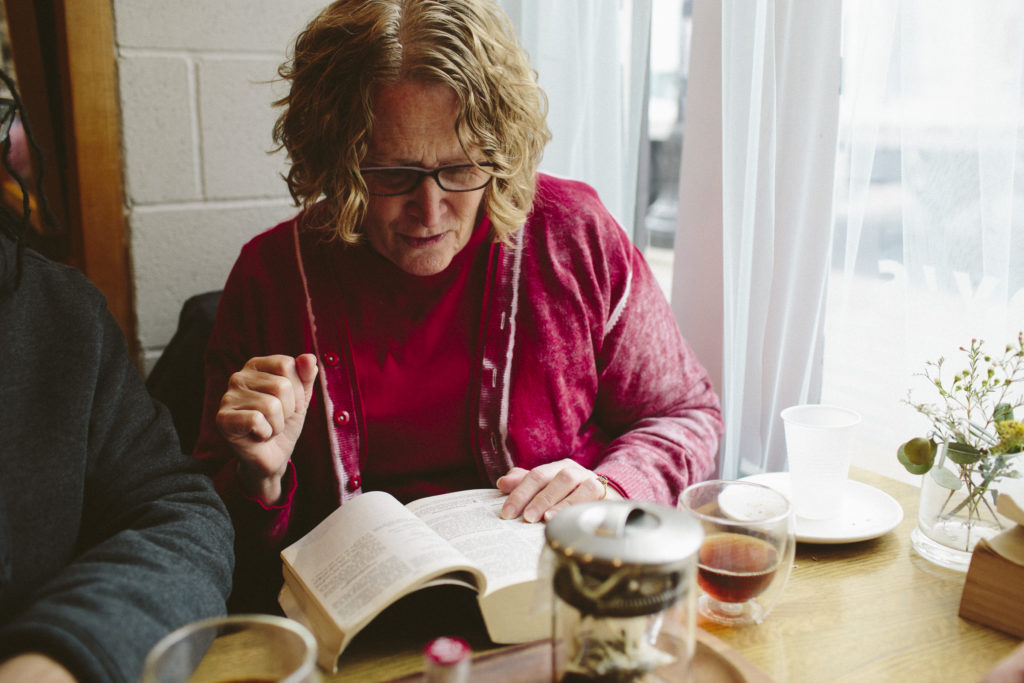
Born a decade earlier than Niwana, Nan, now 62, grew up on a farm on the outskirts of Yorkville, a small city in rural Illinois.
Her family had deep roots in the area, tracing their ancestry there to pioneer days. She joined a 4-H club. She grew up going to church.
But around 16 years old, she discovered “road drinking,” which she engaged in without inhibition.
“You go out to a country road, and you stop and just drink in the car,” Nan says. “Someone would have a bottle of wine, and just pass it around.”
Niwana looks at Nan as she recounts her childhood, her espresso-colored eyes agape, and says with disbelief, “Nan! I just can’t picture that!”
They sit together at a table in a café in Uptown called Everybody’s Coffee. A series of woodcuts and lithographs by a Virginia-based artist named Steve A. Prince hang on the walls. He has named his exhibition “Sankofa: Rebirth.” Sankofa is a West African phrase roughly meaning “go back and get”— a journey that embodies the concept of reaching backward while moving forward.
The black and white woodcuts depict celebrations of black life and the history and trauma wrought upon black communities. They embrace the merging of the past and the present, and they feel extra poignant as they surround Nan and Niwana, given where God has taken both of them, of how He has saved them despite their pasts, and of how they are still becoming who He has called them to be.
For Niwana, just the act of breathing—of being—makes her cry.
She takes off her glasses and inhales as the tears come.
“I’m alive,” Niwana sobs. “I just thank God for breath.”
She still bears somber scars from the culture in which she grew up, where fistfights and questionable influences pervaded Niwana’s life—including drugs.
Cocaine. Heroin. Weed.
“I was a crack head,” she says. “I smoked weed. I did it all.”
She first remembers selling drugs at 13 or 14 years old.
“Being in that environment, that’s all I knew,” she says. “That’s how I made my money. And that’s how I became my own best customer. You gotta see what your merchandise is about. That was my mentality back then.”
Her long dreads swung as she talked, some of the tips woven into small ivory shells.
“I was sneakin’ and creepin’,” she says. “I did a lot of things for drugs.”
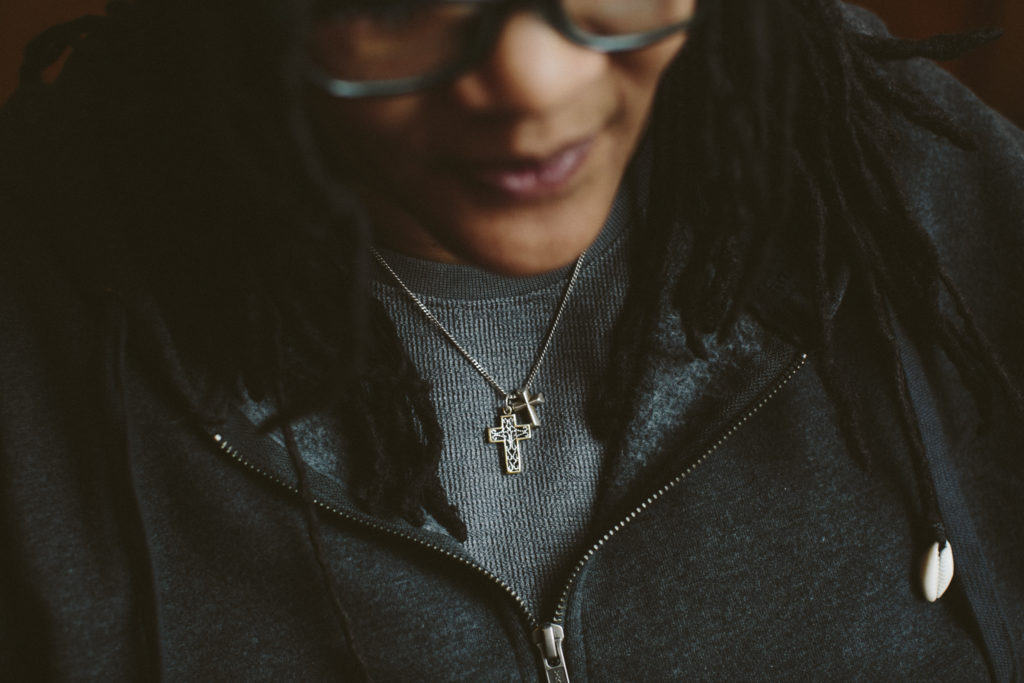
She keeps a small silver circle on the fourth finger of her left hand and a tiny cross on a chain around her neck. She bought the jewelry when she came into a mound of cash through her dealing, before she wasted the rest of it on drugs. She wears these accoutrements to remind her of where she was, so every day she can see how far God has brought her.
A few years before Niwana started dealing drugs, Nan enrolled in Illinois State University in Normal, a city in downstate Illinois.
After moving away from home, Nan says she lost the things—like family, church and routine—that had grounded her.
“I landed on a floor of girls that really liked to party,” she says. “I just started in with all that.”
She tried to do it all, hitting up the bars ‘til late and then trying to wake up for 8:00 a.m. classes.
“A hangover ain’t no joke!” Niwana interjects knowingly.
Then, Nan got mononucleosis, and the school sent her home to recuperate. There, as she fought to recover, she prayed, “God, I’m so sick of my life, and I don’t want to live this way.”
In return, she heard silence. Nothing. Like praying to a brick wall, she says. And yet.
After returning to school, Nan discovered a senior named Judy had moved onto her floor while she had been sick.
Judy befriended Nan, which made Nan think, “Whoa, I don’t know why she wants to be my friend.”
“That’s how I felt about you!” says Niwana, turning to Nan.
Nan smiles, continuing her story. She invited Judy to a party, but Judy declined, saying she was a Christian. Later that night, Nan would make her way back to Judy, saying, “I’ve been trying to find someone to tell me how I can get to know God.”
Judy started drawing on a piece of paper, sharing the gospel with Nan through an illustration Nan still has more than four decades later. Later, Nan realized Judy had written down a wrong Bible reference, “but it didn’t matter because I was really searching for God.”
That’s how Nan met Jesus, and one week later, Judy invited Nan to a Navigator Collegiate conference that included a Scripture-memory workshop.
Wow, Nan thought to herself. People my age are actually taking the Bible seriously.
“Eventually, I figured, ‘Hey, what Judy did with me, I can do with somebody else.’ I could help them get to know Jesus and help them start to walk with the Lord.”
By the time Niwana walked into Nan’s Bible study seven years ago, both their lives had taken several swerves.
After graduating college, Nan began women’s ministries and collegiate work with The Navigators. She met a man who became a Christian in the U.S. Navy. He had come to her campus on the GI Bill. He also toted a list of qualities he wanted in a wife and told Nan she fit every one of them—except she couldn’t sew.
Nan had been praying about a potential husband, but she had also been feeling a call to go overseas with The Navigators. She spent that summer in Japan.
“I came back, thinking I was going to break up with him because I really loved being overseas,” says Nan, “but instead, I got convinced otherwise, and we were engaged in November.”
They married in May, despite some of Nan’s concerns about him, and had two sons, moving around the country to serve with The Navigators.
Over the years, Nan’s concern grew into alarm. Her husband’s episodes of anger escalated into unpredictable rage. Interventions were tried but didn’t help, and eventually, Nan moved her sons away from the toxicity of their marriage and into her friend’s house in central Illinois.
Meanwhile, Niwana had been doing her dealing among familiar city blocks, unable to kick what had become a lifelong addiction. She had been shot at, stabbed, jumped, and beaten. Scuffles, violence, and drugs swirled around her.
Through it all, she had a daughter and a son. Then one day, about 13 years ago, Niwana got the news her daughter had received a stellar report card, and she dropped by the corner store for some “zoo-zoos and wam wams,” a reference to snacks and treats. On her way out, Niwana says two women she knew from the neighborhood tried to rob her. A fistfight ensued. She ran.
And then the car hit Niwana.
When she’s in the West Side now and passes by Mount Sinai Hospital, Niwana still looks up at a window on the third floor where she spent so much time, regaining feeling in her legs and learning how to take steps.
For years, she kept her crutches under her bed.
“You heal my body,” Niwana had told God in the hospital. “And I’ll serve you.”
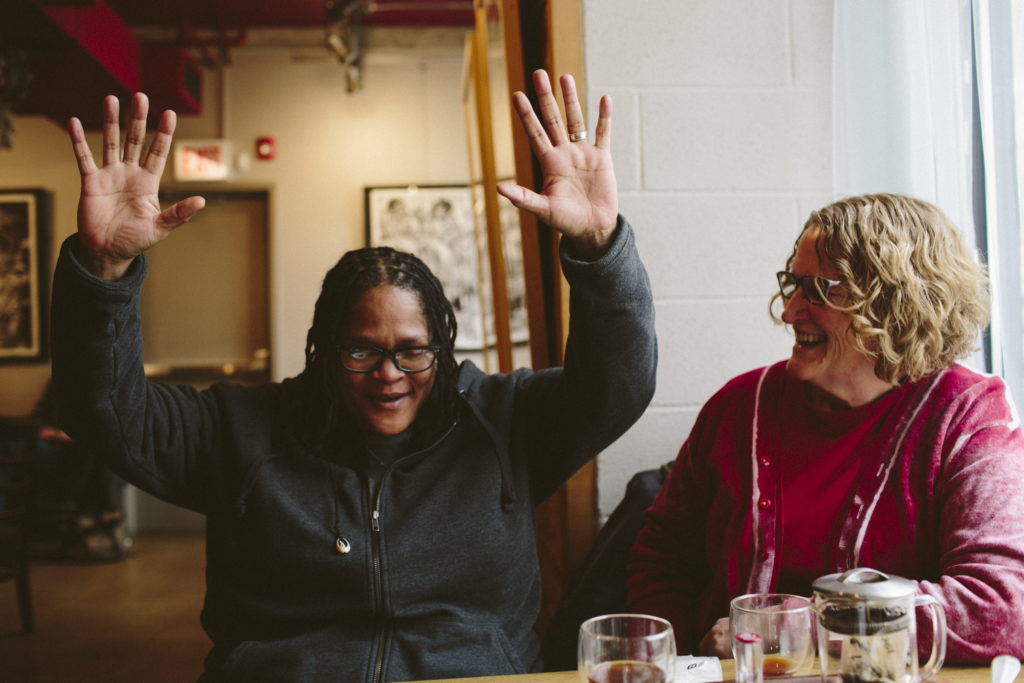
God did his part. Niwana couldn’t quite do hers.
Desperate for drugs, Niwana went back to her spot on a West Side street and stayed there for two days, getting high—with a collapsed lung.
But when she had no place to go, homeless for the third time in her life, God took hold of Niwana.
She made her way to Breakthrough Urban Ministries and went through its programs. Breakthrough staff set her up with housing in Uptown, in the building where she met Nan.
At first, Niwana would sit as Nan made her way through the Gospels with the small group of women, not saying one thing.
She took it in, wanting to learn but feeling a little suspicious, too.
Drugs had become her life, but she had also grown up around a church tradition, too.
Niwana remembers the times she had tried to get clean, when staying sober for three days seemed like the biggest accomplishment. During those times, she tried to attend church, sensing she needed God.
When she did, she felt people’s eyes on her. She felt judgment—judgment about what she wore, who she was, what she did. Like she could never be enough.
And so she left. She went back to the drugs, to the wandering, to the homelessness.
But at some point, she felt it from her core: She wanted to change her life. If she didn’t, she thought, it would be the greatest of insults.
“After I got hit, and God healed my body, I took it for granted,” she says. “I was homeless again. But God has brought me too far. He’s blessed me to not be another statistic. He delivered me, and He freed me, and that was like me pimp-slapping God in the face.”
Nan had moved to Chicago in 2004 and stayed after taking a 24-hour walk through the streets with fellow Navigator Larry Hope, deciding she had heaps to learn from Larry, from books, from the city, and from those she saw out in the night. And from Niwana.
At Nan’s Bible studies, Niwana began to say more, to share more. Nan knew Niwana was really serious when the study moved a few blocks and nearly all the women, some of whom were not yet clean from drugs, fell away.
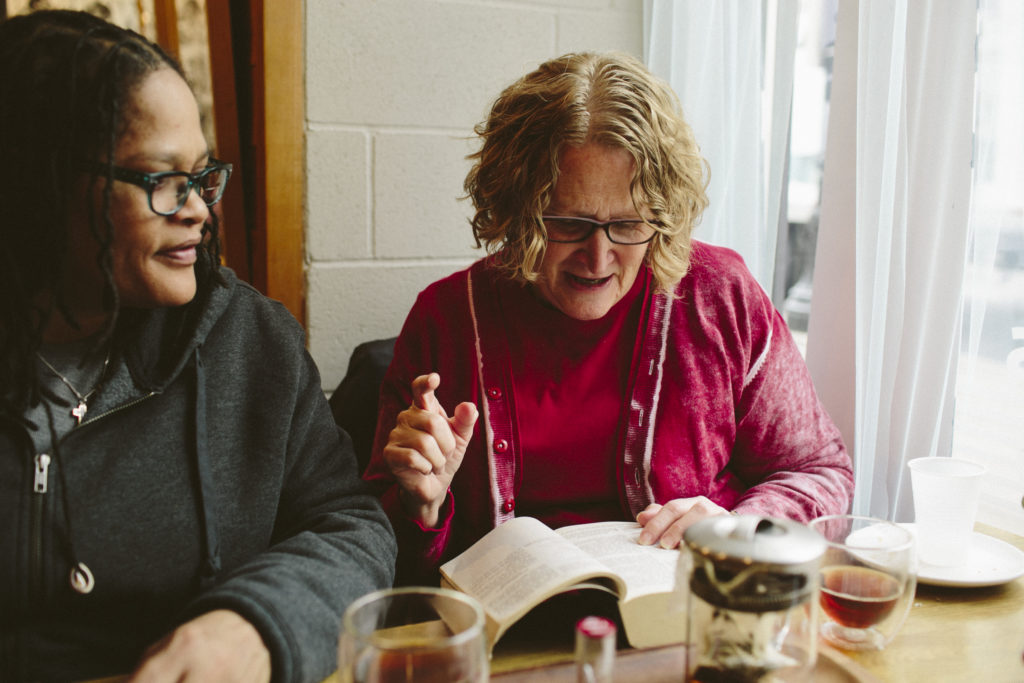
Nan introduced Niwana to Edgewater Baptist Church, where Niwana found a community of believers who did not judge her, who embraced her for who she is. She participates as a member there now, and she serves the church annually as a high school camp counselor, taking great joy in sharing her story and all God has done.
Nan now serves as the city leader for Navigators I:58 ministry, which engages with communities in growth and rebuilding efforts. When she moved recently to Little Village on the West Side, away from Niwana’s North Side neighborhood, the church community helped Niwana realize she still had friends who would love and surround her.
Even though Nan has moved, every other Wednesday, she still shows up for Niwana. And Niwana shows up for Nan.
They have done this for the past seven years, and this month, they do it again, working their way through the New Testament.
Since they met, Niwana has had another surgery and experiences discomfort while walking, but she has stayed away from drugs. When the pain feels awful, she’ll go to Nan, who keeps a few aspirin pills for her.
Last year, Nan and Niwana took a van to Cincinnati together to attend I:58’s national conference, one of the few times Niwana has been out of her familiar neighborhoods.
When they visited the Underground Railroad Freedom Museum, Niwana photographed a Bible belonging to people who had been enslaved.
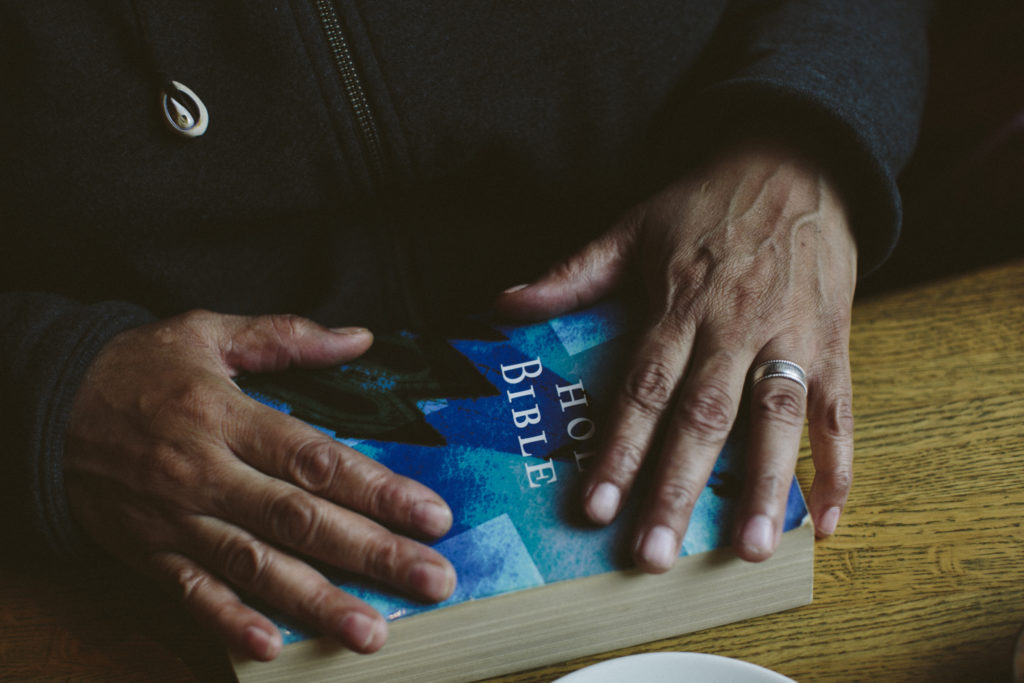
“If they took that big Bible around,” she says, “I can tote mine around.”
Niwana has a nickname for Nan, one Nan loves because it signifies Niwana sees her as family: Lil’ Miller.
“You know what? Niwana says. “Lil’ Miller—she is my home girl.”
Through the years, their relationship has become more mutual, with Nan coming to Niwana, too, and sharing through hard times, like her mother’s illness.
“It can take one person that God brings in your life, who puts your booty on fire, like ‘I got to move!’” Niwana says, looking at Nan. “I didn’t think that was true until you came.”
On a recent Wednesday, they read through Titus over Chinese Breakfast tea and pastries at Everybody’s Coffee, a café opened by Jesus People USA Covenant Church, a Christian communal living community.
The artwork depicting Sankofa surrounds them, an echo to reach back in moving forward.
Niwana rubs her fingers over a second, newer cross she wears, a silver and gold one. It lays next to the one she bought with drug money.
She bought it “to remind me that I’d rather have Jesus than silver or gold.”
It symbolizes this new era of her life, one that saw her daughter graduate from college and become an art teacher, one in which Niwana has stayed eight years clean, one in which she wants with all her being to serve God and others.
“Anything concerning the Lord, I want a part of it,” Niwana says. “I don’t have a lot to give, but I have me. I have my testimony. So all right, Lord.”
Nan pats Niwana arm.
“I have a new phrase for you,” she tells Niwana. “You want to hear the new one?”
“‘I am not what I do,’” Nan says, “‘I am not what I have. I am not what others think or say of me. I am a beloved child of God.’ That’s a paraphrase, from a guy named Henri Nouwen.”
Niwana and Nan put their arms around each other.
“She’s stuck with me,” Niwana says, her eyes twinkling.
They hug and their heads fall together, purple glasses next to green, black dreads mingling with blond curls. One from the city, one from the farm. One called out of addiction, both called out of abuse. Two moms. Two friends. Two stories, forever merged because of Jesus.
Erin Chan Ding is a freelance journalist with the Chicago Navigators.



